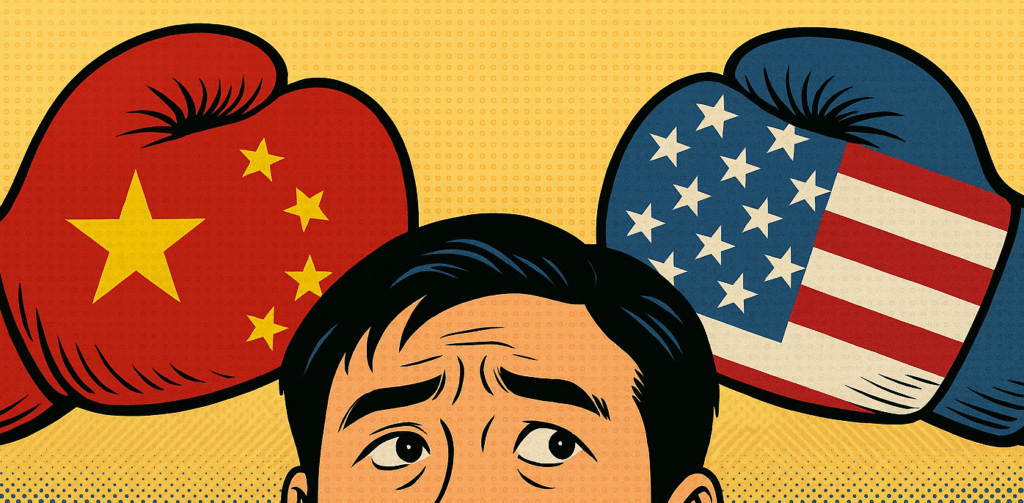
In recent years, I can’t help but notice the media headlines buzzing with the increasing tension between the West and China — from trade wars, COVID-19, espionage accusations and technological decoupling to political disputes and global influence. As an ordinary British born Chinese, we often think that most of the geopolitical issues should not affect our daily lives and it shouldn’t have anything to do with us. But with the looming conflict between major world powers, sometimes we can’t help but find ourselves in an uncomfortable and unsettling position. Which makes us question; what is our position and where do we fit in here? This post is by no means a political commentary, but it’s a concern that we need to be aware of.
Caught Between Conflict
The current tension between China and Western powers is lead by a complex interplay of economic competition and shifting global power dynamics over the past decades. China’s rapid economical and military advancement has positioned it as a formidable challenger to U.S. led global hegemony. Leading to the current political dispute with the trade war, technology transfer ban and the territorial conflict in the South China sea.
The media framed anti-China stories in ways that stoked fear, reviving echoes of the ‘Yellow Peril’ trope in a contemporary form. Public discourse blurred the lines between government policy and suspicion of anyone with a Chinese name or face. The outbreak of COVID-19 has further exemplified this and heightening xenophobia towards the diaspora. Hate crimes against people of East and Southeast Asian descent have soared where racism is no longer just microaggressions but directly overt. Differentiating ourselves between loving Chinese culture and endorsing a political state, between being ethnically Chinese and political alignment is becoming almost a tiring burden.
It’s unfortunately that geopolitical tension seeps into the subtler corners of daily life, potentially leading to negative perceptions and discriminatory experiences. It’s as if being Chinese is no longer a cultural identity but a political position you’re presumed to be representing. To our annoyance we may often get asked about our opinions on the subject which we have no interest or understanding, just like a test of loyalty and allegiance, that enforces the feeling of being constantly put under the gaze of suspicion and scrutiny.
The Question of Belonging
The Chinese community in the UK is very diverse, encompassing people of different waves of migration from different parts of the world, each with its own motivations and experiences. Many have no direct link to China (as in the People’s Republic of China) or even set foot in the country at all. This also depicts that the community cannot be represented by a singular perspective (or the absence of one) when it comes to geopolitical affairs.
For many British Chinese and other Chinese diaspora living in the West, it has long meant keeping our heads down, being “good immigrants,” contributing without complaint. But it seems that the model of silent assimilation is not good enough and that we are still being viewed through the lens of the “perpetual foreigner”. Maybe it’s time to rethink how we can approach integration, by looking through the complexity and nuances. Understanding how we can contribute to mainstream British society but at the same time honouring one’s cultural identity without being treated like a threat.
Navigating the Conflicts
It’s difficult to foresee how the current geopolitical tensions will unfold and whether they might escalate (or god forbid, lead to military action). It feels overwhelming to be caught in the middle of something that seems so far away and beyond our control, that most ethnic Chinese are reluctantly being dragged into. It’s a struggle to embrace our cultural heritage without being reduced to proxies in this geopolitical affair.
But the question remains on how we can navigate through the current geopolitical climate and how can we tackle this? On an individual level, sharing our perspectives and fostering open conversations to counter misinformation and stereotypes would be a good start. Making people understand that the Chinese diaspora is not a monolithic group. As a community we can connect and network with others who share similar views, this might involve informal networks of friends, through forums or social media platforms.
The ripple effects of global geopolitical tensions between the West and China have created potential challenges for the Chinese diaspora where most of us call UK home. It’s crucial, now more than ever, to draw a distinction: the policies of a government should never be conflated with the identity and perspective of an entire community. There’s no easy way to resolve the situation and any solution is probably for beyond our scope. But my hope to foster greater understanding by recognizing the complexity of our identities. More than ever, it’s imperative to encourage others to make our voices heard, whether as an individual or as a community. Most of all we just want to get on with our ordinary lives.
